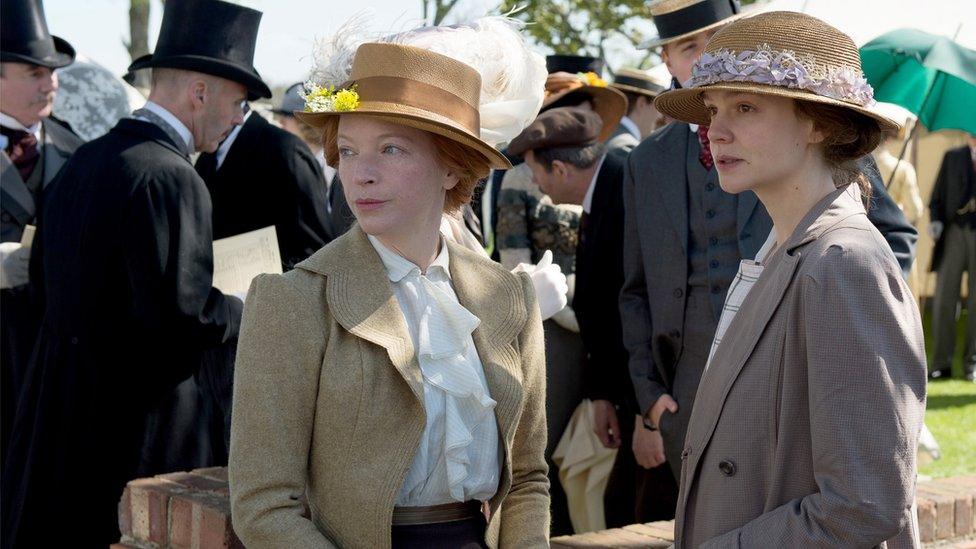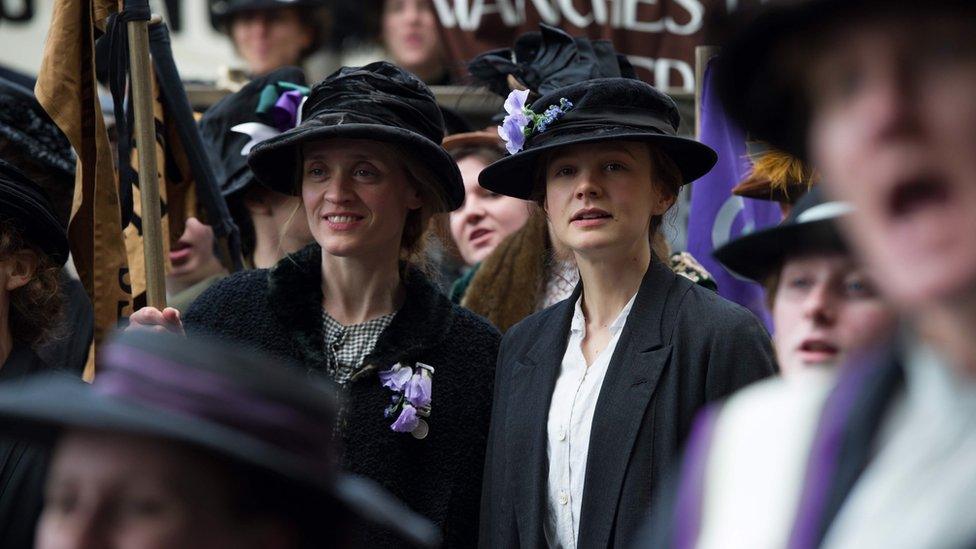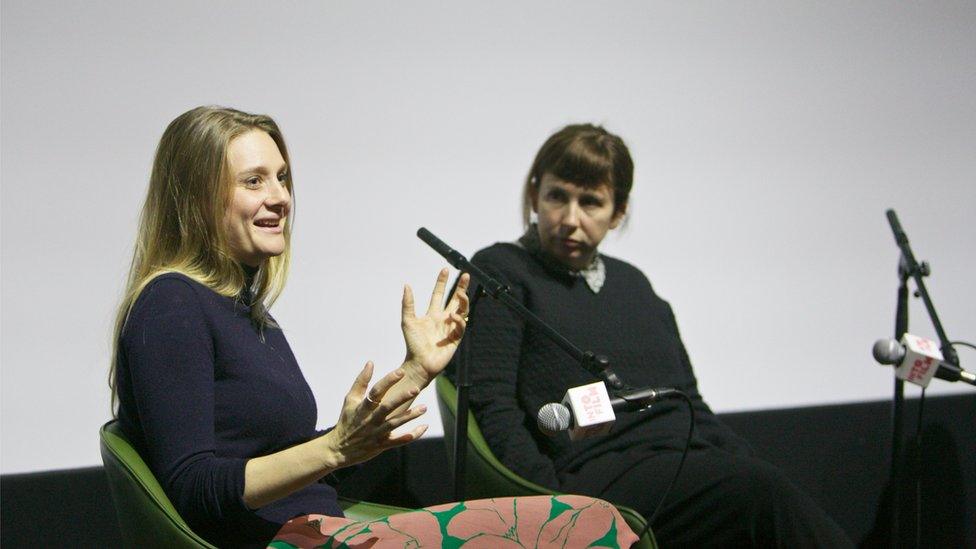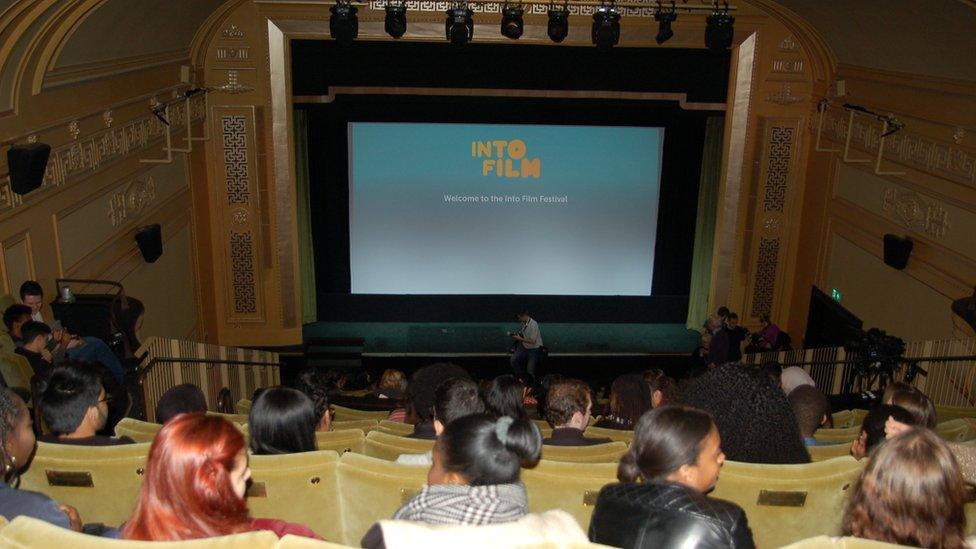Teenagers grill makers of Suffragette movie
- Published

Natalie Press and Carey Mulligan play Emily Wilding Davison and Maud Watts in Suffragette
More than a century on, the death of suffragette Emily Wilding Davison, trampled by the King's horse at the 1913 Derby, still has the power to shock.
Its depiction, at a screening of the film Suffragette to a teenage audience as part of the Into Film Festival, external, drew gasps from those perhaps not familiar with the story of the votes-for-women campaigner whose death propelled the cause on to the newspaper front pages.
But a question-and-answer session with screenwriter Abi Morgan and actress Romola Garai revealed other viewers had done their homework.
"It's an incredible film, stunning," said Khadija, 17, from Ellen Wilkinson school in west London.
Historical debate
She particularly liked its focus on a group of working-class campaigners in the East End - but took issue with the absence of leading figures in the movement who were of Asian origin.
Her comments echo complaints when the film was launched last month, that it had airbrushed out the contributions of ethnic minority women to the movement.
"I did a bit of research beforehand and came across a group of Asian women that were at the forefront.
"So I came into the film really excited to see them and to be honest I was quite disappointed they simply weren't there, not even in the extras," said Khadija.
Abi Morgan knew exactly who she meant - two Asian women played a large part in funding the movement.
"But both of them were aristocratic," and one, Princess Sophia Duleep Singh, was a god-daughter of Queen Victoria, she explained.
Mass migration had yet to happen and although there was some - it was predominantly Irish and Jewish, she said.
"I could only find one photograph of a woman of colour in the suffragette movement."
She gave Khadija her email address and asked her to pass on her research.

The film focuses on a group of working-class women
Other audience members were keen to explore the balance between fact and creativity in historical drama.
"Ultimately it's an act of creation," said Abi.
"What I wanted to do was create fictional characters that would collide with history.
"I discovered this area of east London and a really interesting group of women to focus on."
Modern battles
Sometimes practical problems got in the way of accuracy too, she explained.
For example, a key speech by suffragette leader Emmeline Pankhurst, made in the film outside a London house, was in fact delivered in the Albert Hall. "But we couldn't afford the Albert Hall. You are always cutting your cloth."
The discussion highlighted how some parts of the film are still relevant today, particularly battles for equal pay and against sexual violence.
Romola Garai, who plays the wife of an MP, said women of the political class could involve themselves in the movement but were often constrained by their husbands' careers.
But the working-class heroine of the film "has no safety net. So the stakes are much higher. She has no family network, no education to fall back on," said the actress.

Actress Romola Garai and writer Abi Morgan discuss the film after the screening
"Would you have been a suffragette at the time?" was another question.
"There were a lot of women involved in the movement at the time who wore badges and jewellery - the equivalent of wearing a T-shirt.
"I think I would have done a bit more than wear a T-shirt," said Romola.
"I have a bad feeling I might have written a cheque," said Abi, "but it's a bit like asking if I would be brave enough to stand up and protest against rape in India or be part of the Arab Spring.
"The fury and anger of some of these protests makes me feel that maybe I could."
Funding
She explained that it had taken her six years to get funding for the movie and she finally managed to raise $14m (£9m), which is really quite a small budget for a film.
If she had been male and looking for funding for a film based on male struggles, she believes the funding would have been easier.
It is ironic, she said, that "the one film that promotes equality for women is having its diversity questioned.
"The film is absolutely about promoting equality for all women, including women of colour."

Teenagers wait for the film to start as part of the Into Film Festival
However, she was glad the question had been raised "because we need to talk about it".
Khadija says she will be continuing the conversation by email.
"I am definitely going to pass on what I thought of it and things I came across.
"It is important that she is interested for future films, which hopefully women will also get involved in, which I think is really exciting."
Suffragette is one of 150 films being shown free to 400,000 children and young people during the Into Film Festival, which runs until 20 November across the UK.